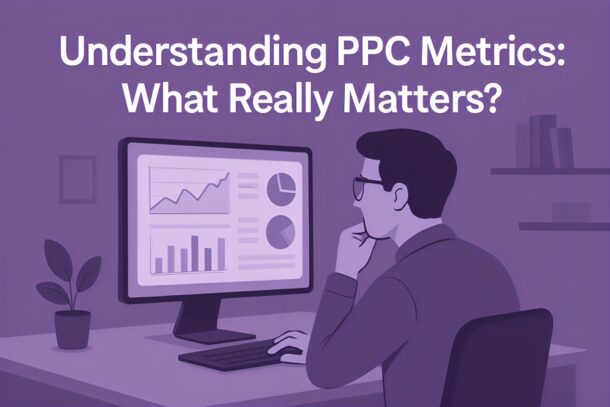In the fast-paced digital marketing landscape, businesses are constantly searching for ways to maximize their return on investment. One of the most powerful tools in this journey is pay-per-click advertising, yet its success depends largely on how well we measure and analyze PPC Metrics. Without a clear understanding of these metrics, even the best-designed campaigns may fail to deliver meaningful results. Therefore, learning which indicators truly matter is essential for marketers who want to gain a competitive edge.
Why PPC Metrics Are Essential
To begin with, PPC Metrics act as a performance scorecard. They reveal whether your ads are reaching the right audience, how effectively your budget is being spent, and what outcomes you are achieving. Moreover, they allow businesses to refine their strategy, ensuring every click contributes to growth rather than wasted expenditure. By focusing on metrics that align with business goals, marketers can not only optimize their ads but also increase profitability.
Key PPC Metrics to Monitor
Although there are dozens of available measurements, not all are equally important. Thus, prioritizing the right PPC Metrics ensures that businesses concentrate on what actually drives performance.
-
Click-Through Rate (CTR): Indicates how often people who see your ad actually click on it, showing relevance and engagement.
-
Quality Score: A Google rating that evaluates ad relevance, keyword targeting, and landing page experience.
-
Cost per Click (CPC): Measures how much you pay each time a user clicks your ad, directly impacting budget efficiency.
-
Conversion Rate (CVR): Reflects how many clicks lead to desired actions, such as purchases, sign-ups, or inquiries.
-
Return on Ad Spend (ROAS): Reveals how much revenue is generated for every dollar spent on ads.
By tracking these, marketers can gain clarity on where improvements are needed.
The Importance of CTR and Quality Score
CTR and Quality Score go hand in hand when measuring ad performance. A higher CTR suggests that your ad resonates with your audience, while a strong Quality Score reduces advertising costs and boosts visibility. Furthermore, when these two PPC Metrics improve together, businesses often notice better placement in search results, ultimately leading to increased conversions.
Why Conversion Metrics Matter Most
Even though clicks are essential, conversions often tell the real story. After all, the ultimate goal of most ad campaigns is not just traffic, but tangible results. Hence, analyzing conversion rate and cost per conversion provides insight into whether your investment is paying off. These PPC Metrics help marketers shift their focus from vanity numbers to actual outcomes that impact the bottom line.
Going Beyond Basic Numbers
While standard indicators provide valuable information, advanced PPC Metrics offer deeper insights into campaign effectiveness. For instance, impression share shows how often your ads appear compared to competitors, while view-through conversions demonstrate the influence of display ads even when clicks don’t occur immediately. Moreover, engagement metrics such as time spent on landing pages further illustrate whether users find your content compelling.
Tips for Making Metrics Actionable
Knowing the numbers is one thing, but using them to make decisions is where the real value lies. Therefore, marketers should focus on transforming raw data into actionable insights:
-
Set Clear Goals: Define what success looks like—brand awareness, sales, or lead generation.
-
Segment Data: Break down results by audience, device, or location to uncover trends.
-
Test and Optimize: Run A/B tests to refine ad copy, targeting, and design.
-
Monitor Frequently: Regular reviews prevent wasted spending and help identify issues early.
-
Connect to Business Outcomes: Always tie metrics back to revenue, customer acquisition, or growth.
Thus, metrics serve as a compass, guiding campaigns toward continuous improvement.
Common Mistakes Marketers Make
Despite the importance of metrics, businesses often misinterpret or misuse them. For example, focusing too heavily on impressions without considering engagement can lead to inflated results that don’t translate into value. Similarly, ignoring Quality Score may result in higher costs despite achieving traffic. Another mistake is failing to connect metrics with long-term objectives. Without this alignment, even well-optimized campaigns can miss the mark.
Conclusion
Ultimately, the effectiveness of any campaign relies on more than just ad visibility. By paying attention to PPC Metrics, businesses gain a clear understanding of performance, identify weak spots, and make smarter decisions for the future. Companies such as Insprago continue to help organizations leverage data-driven insights, ensuring that every click counts. By aligning PPC campaign strategy with business goals and seeking expertise from trusted lead generation companies in Dubai, businesses can not only optimize their budgets but also achieve consistent, measurable growth in today’s competitive digital landscape.
FAQs About PPC Metrics
Q1: Who should monitor PPC metrics regularly?
Any business investing in pay-per-click advertising should track metrics, but ideally, marketing teams or digital specialists should analyze them consistently to ensure campaigns stay efficient.
Q2: What is the most important PPC metric to track?
While it varies by business goals, conversion-related metrics often matter most because they directly connect to revenue and growth.
Q3: How often should PPC metrics be reviewed?
Ideally, metrics should be checked weekly for performance trends, but more detailed monthly reviews help with long-term optimization.



















